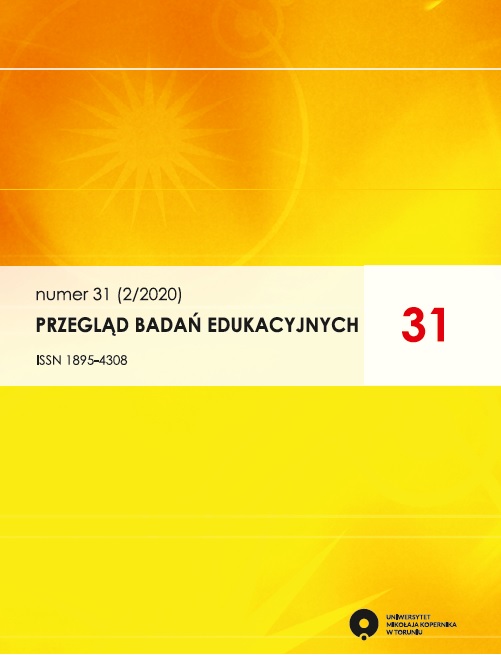Sensory Preferences of Teachers in the Context of Computer Educational Tools Using
DOI:
https://doi.org/10.12775/PBE.2020.025Keywords
sensory preferences, primary education teachers, computer educational tools, new technologiesAbstract
The article is an attempt to show the relationship between teachers’ sensory preferences (represented by the VAK model) and the degree of acceptance, level of application, and form of
work with new media. The article presents the results of pilot studies, as well as the results of the proper research conducted in 2019 in a group of 367 teachers. The research referred to was carried out in the Kujawsko-Pomorskie Voivodeship (Poland). The selection of the research group was random. The research was quantitative, and additionally supported by qualitative analysis. The statistics presented were determined using the χ2 test, as well as using the Cramer V coefficient. The conducted research shows, that sensory preferences of respondents do not remain indifferent to the learning process. They determine the activities of teachers and directly create a working environment for students.
References
Brown, D. H. (2000). Principles of Language Teaching and Learning, 4th ed. White Plains, NY: Longman.
Christov, T. (1994). Słaby uczeń czy ‘translator’? [A Weak Student or a ‘Translator’?]. Gestalt. Kwartalnik Polskiego Stowarzyszenia Psychologów Praktyków, 13, 28–30.
Denek, K. (1992). Nowe paradygmaty pomiaru efektywności kształcenia w szkolnictwie zawodowym [New Paradigms for Measuring the Effectiveness of Education in Vocational Education]. Pedagogika Pracy, 20(2), 41–50.
Dryden, G., & Vos, J. (2003). The Learning Resolution: to Change the Way the World Learns. Publisher: Torrance, California: The Learning Web.
Duff, A., & Duffy, T. (2002). Psychometric Properties of Honey 6 Mumford’s Learning Style Questionnaire (LSQ). Personality and Individual Differences, 22, 147–163, doi: 10.1016/S0191-8869(01)00141-6.
Fenstermacher, G. D., & Soltis, J. F. (2000). Style nauczania [Approaches to Teaching]. Warszawa: Wydawnictwa Szkolne i Pedagogiczne.
Flanders, N. A. (1962), Using Interaction Analysis in the Inservice Training of Teachers. Journal of Experimental Education, 30 (4), 313–316.
Furmanek, W. (2012). Problemy efektywności edukacji informatycznej i informacyjnej [Problems of IT and Information Education]. Dydaktyka Informatyki, 7, 11–44.
Gołębniak, B. D. (2004). Nauczanie i uczenie się w klasie [Teaching and Learning in the Classroom]. In: Z. Kwieciński, & B. Śliwerski (Eds.), Pedagogika. Podręcznik akademicki, tom 2 [Education. Academic Textbook, vol. 2], (pp. 158–205). Warszawa: Wydawnictwo Naukowe PWN.
Hattie, J. (2015). The Applicability of Visible Learning to Higher Education. Scholarship of Teaching and Learning in Psychology, 1(1), 79–91, doi: 10.1037/STL0000021.
Honey, P., & Mumford, A. (1992). The Manual of Learning Styles. Maidenhead: Peter Honey Publications.
Kozielska, M. (2009). Style nauczania akademickiego w aspekcie treści kształcenia [The Styles of Academic Teaching in Terms of the Content of Education]. Chowanna, tom jubileuszowy [the jubilee volume], 161–172.
Kozielska, M. (2012). Rola technologii informacyjnych w akademickim kształceniu technicznym [The Role of Information Technologies in Academic Technical Education]. In: J. Morbitzer, & E. Musiał (Eds.), Człowiek-Media-Edukacja [Human-Media-Education], (pp. 243–256). Kraków: Wydawca Katedra Technologii i Mediów Edukacyjnych Uniwersytet Pedagogiczny im. KEN w Krakowie.
Krupa, A. (Ed.) (2003). Encyklopedia PWN [Encyclopedia PWN]. Warszawa: Wydawnictwo Naukowe PWN.
Ledzińska, M., & Czerniawska, E. (2011). Psychologia nauczania: ujęcie poznawcze: podręcznik akademicki [Teaching Psychology: a Cognitive Approach: An Academic Textbook]. Warszawa: Wydawnictwo Naukowe PWN.
Linksman, R. (2013). How to Learn Anything Quickly: Quick, Easy Tips to Improve Memory, Reading Comprehension, Test-Taking Skills, and Learning through the Brain’s Fastest Superlinks Learning Style. Naperville: National Reading Diagnostics Institute.
MacKeracher, D. (2004). Making Sense of Adult Learning, 2 ed. Canada: University of Toronto Press Incorporated.
Peacock, M. (2001). Match or Mismatch? Learning Style and Teaching Style in EFL. International Journal of Applied Linguistics, 11(1), 1–20, doi: 10.1111/1473-4192.00001.
Pilch, T. (2006). Encyklopedia pedagogiczna XXI wieku, tom 5 [Pedagogical Encyclopedia of the 21st Century, vol. 5]. Warszawa: „Żak”.
Piłatowska, M. (2008). Świadomość stylów uczenia się – korzyści dla nauczyciela i studenta [Awareness of Learning Styles – Benefits for the Teacher and Student]. Acta Universitatis Lodziensis Folia Oeconomica, 217, 121–132.
Rubacha, K. (2011). Metodologia badań nad edukacją [Methodology of Educational Research]. Warszawa: Oficyna Wydawnicza Łośgraf.
Saeed, M. O., Ondracek, J., Bertsch, A., Shefstad, B., Procyshen, M., & Hernandez, M. (2015). An Investigation of Learning Style Theory and GPA at a U.S. University. Inspira-Journal of Modern Management & Entrepreneurship, 5(03), 1–14.
Siemieniecki, B. (2013). Pedagogika kognitywistyczna [Cognitive Pedagogy]. Kraków: Impuls.
Siemieniecka, D., Kwiatkowska, W., Majewska, K., & Skibińska, M. (2017). The Potential of Interactive Media and Their Relevance in the Education Process. International Journal of Psycho-Educational Sciences, 6(3), 1–10.
Simmonds, A. (2014). How Neuroscience is Affecting Education: Report of Teacher and Parent Surveys. WellcomeTrust.
Shams, L., & Seitz, A.R. (2008). Benefits of Multisensory Learning. Trends in Cognitive Sciences, 12(11), 411–417, doi: 10.1016/j.tics.2008.07.006.
Stix, G. (2011). How to Build a Better Learner. Scientific American, 305(2), 50–57, doi: 10.1038/scientificamerican0811-50.
Stoffers, M. (2011). Using a Multi-Sensory Teaching Approach to Impact Learning and Community in a Second Grade Classroom. Retrieved 20 August 2019 from http://rdw.rowan.edu/etd/110.
Taraszkiewicz, M. (2014). Odpowiedzialność zawodowa nauczycieli w kontekście efektywności uczenia się uczniów. Granice i perspektywy [Professional Responsibility Teachers in the Context of Students’ Learning Effectiveness. Borders and Perspectives]. In: G. Mazurkiewicz (Ed.), Edukacja jako odpowiedź. Odpowiedzialni nauczyciele w zmieniającym się świecie [Education as the Answer. Responsible Teachers in a Changing World], (pp. 149–162). Warszawa–Kraków: Wydawnictwo Uniwersytetu Jagiellońskiego.
Taraszkiewicz, M., & Karpa, A. (2009). Jak wspierać zdolnego ucznia [How to Support a Gifted Student]. Warszawa: Wydawnictwa Szkolne i Pedagogiczne.
Taraszkiewicz, M. (2020). Zanim zaczniesz uczyć innych – poznaj samego siebie. O tym jak różnie ludzie uczą się [Before You Start Teaching Others – Get to Know Yourself. How Different People Learn]. Retrieved 21 September 2020 from http://www.fizyka.osw.pl/Portals/physicseducation/Style%20uczenia%20si%C4%99.doc.
Vester, F. (2006). Myślenie, uczenie się, zapominanie: co dzieje się w naszej głowie? Jak uczy się mózg? Dlaczego niekiedy zawodzi? [Thinking, Learning, Forgetting: What’s Going on in our Head? How Does the Brain Learn? Why it Fails Sometimes]. Bydgoszcz: Wydawnictwo Polsko-Niemieckie Glossarium.
Weale, S. (2017). Teachers Must Ditch ‘Neuromyth’ of Learning Styles, Say Scientists, “The Guardian”. Retrieved 21 August 2019 from https://www.theguardian.com/education/2017/mar/13/teachers-neuromyth-learning-styles-scientists-neuroscienceeducation.
Downloads
Published
How to Cite
Issue
Section
Stats
Number of views and downloads: 630
Number of citations: 0



